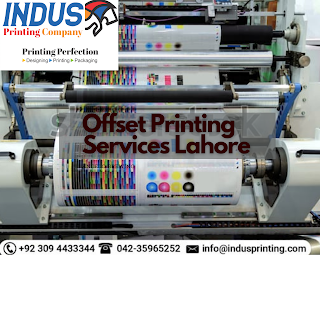Important Of Printing Press Pakistan For Business
The
traditional printing press Pakistan has been around for a long time, though the
digital printing press has only recently become commonplace. The press that is
used to print on paper, fabric or aluminum is known as the printing press.
There are different types of this type of printing press in Indus
Printing. There are four different types - the
roller, the drum, the flex plate and the clamp. Each type has its own distinct
advantages and disadvantages, which we will discuss below.
A roller
copier uses one roll of paper to produce duplicates of an image or text. This
is the least expensive method of printing
press Pakistan and is ideal for low volume jobs or those that need to be
produced in large quantities. There are some types of these printers that
require little or no maintenance to keep them running smoothly, though you do
have to replace worn parts on a fairly regular basis. Because it has few worn
parts, they are less likely to develop clogging problems.
This type
of digital Printing Press Pakistan maintenance is simple and easy to do.
However, you have to replace worn parts as required. It is important to perform
preventive maintenance to reduce the risk of a jam or other such problem.
Machine Use In Printing Press Pakistan
A drum
type machine is the most economical but also the heaviest and most prone to
jams. They are very convenient for single or double side printing because there
is no requirement for any feed balancing system. This means that you can do printing
press Pakistan on either side of the paper with little worry about getting a
feed line clogged. You have to pay more attention to keeping the drum free from
dirt and debris because if it gets too full with dust or other matter, it will
become nearly impossible to fill. In order to maintain this type of printer,
you will have to perform maintenance on a fairly regular basis.
On the
other hand, the roller type is very convenient because it is easy to use.
However, its disadvantage is that it is also more likely to get jammed. This
printer has a mechanism called the 'ringing system' where there is a piston
going back and forth. If dirt or debris is caught on the interior or outside of
the ring, it causes a delay in the rest of the rollers so that the image gets
printed at a lower quality. You have to lubricate these roller parts on a
regular basis to ensure that there is no problem.
Processes Printing Press Pakistan
If your
printer has a cleaning roller, you do not have to do much else other than to
wipe it down once in a while to remove any prints and dirt that might be
trapped in the cleaning path. It is important to note that a dirty roller may
prevent Printing press Pakistan, to take
place completely. So, for this reason, it is highly recommended that the roller
is cleaned on a regular basis so that the quality of the final printing press Pakistan
images can be maintained at all times.
When
choosing the Indus Printing press Pakistan,
you have to pay attention to all its parts and consider them critically. Each
of these parts performs a specific task and in some cases, they are required to
be compatible with each other. It is vital that the roller and the other key
parts are compatible so that proper functioning of the machine can be
guaranteed. The three main roller parts are the head, the body and the press
plate. The head contains all the moving parts including the ink supply and the
ink drum so that it facilitates proper printing processes.
The body
contains all the moving parts including the support structure, the piston, the
clamps and the seat. The printing press Pakistan plate is usually the solid
part that lies on top of the body. It is here that the plates are fixed and it
includes the rollers and the alignment shafts as well. These parts should all
be made of the best quality parts so that they provide optimum performance for
years to come.




Comments
Post a Comment